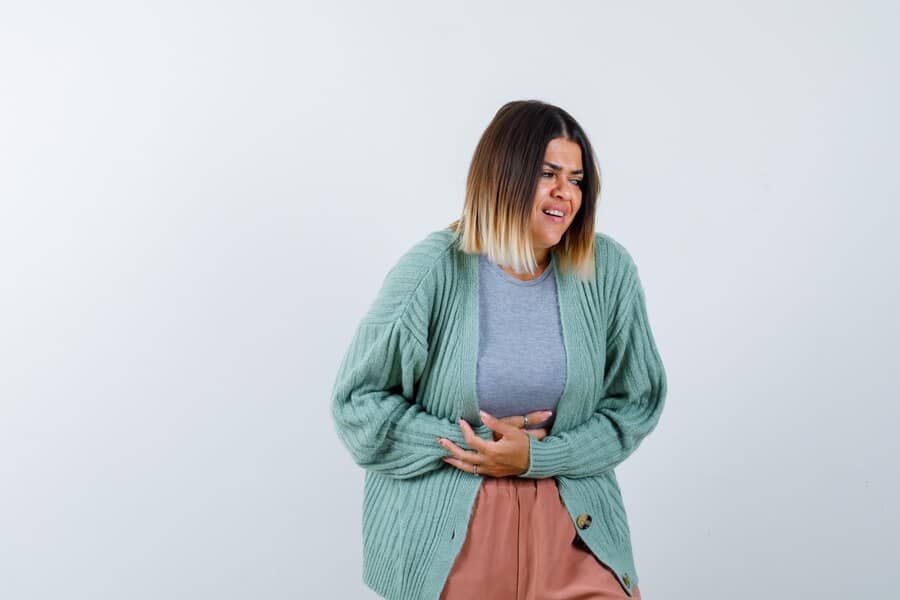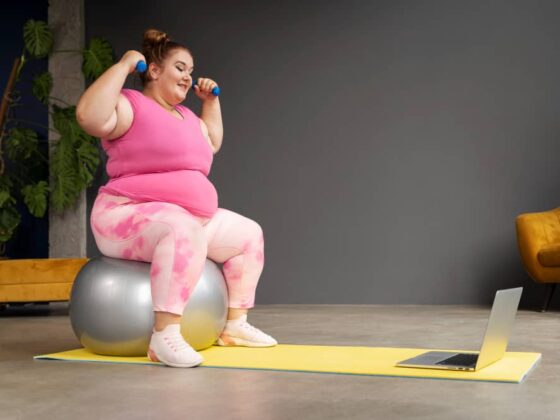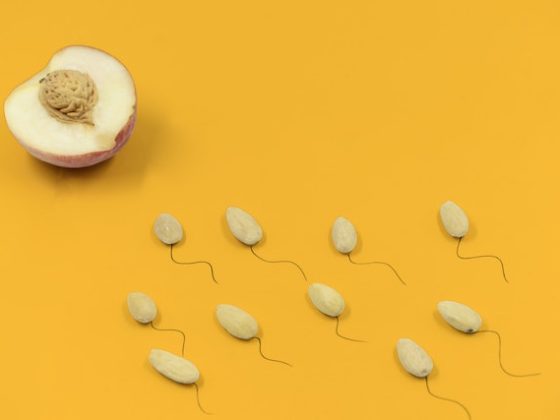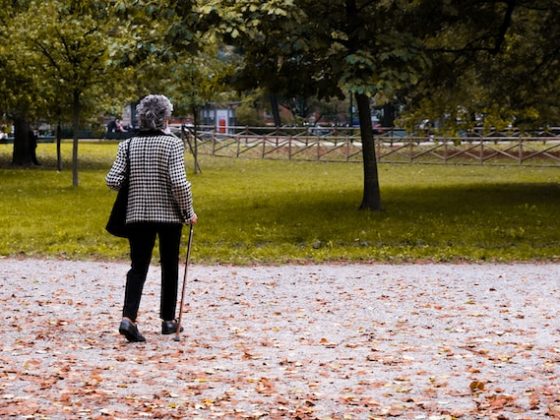Hey there! This post may contain affiliate links. As an Amazon Associate, I earn a teensy commission from qualifying purchases when you buy through these links (at no additional cost to you). For more info, please check the full disclaimer.
IBS is one of the most unpredictable diseases, accompanying a variety of symptoms. This illness may hinder your day-to-day activities and lead to physical and emotional distress. Knowing about the common IBS symptoms in females can help identify the signs at the right time and get proper treatment right away.
In this blog, you’ll find everything you need to know about women’s IBS symptoms.
What is IBS?
IBS (Irritable Bowel Syndrome) is a group of chronic symptoms targeting the large intestine. The most prominent female IBS symptoms are abdominal pain, diarrhea, constipation, and bloating.
IBS symptoms in females are usually life-long, but their frequency and intensity may change. The symptoms of IBS generally emerge during periods of stress or the presence of other triggers.
IBS does not cause permanent damage to the large intestine or increase the risk of colon cancer. Changes in diet, lifestyle, and medication can help manage the disorder.
Read More: Signs of Vitamin B12 Deficiency
Does IBS Affect More Women than Men?
About 25-45 million individuals in the USA are diagnosed with irritable bowel syndrome, and 2 out of 3 are women with IBS symptoms. According to these statistics, it is safe to conclude that IBS occurs more frequently in women than men.
Although there is no definitive explanation for this distribution, a few factors play a role in the onset of early-stage IBS symptoms in females.
Estrogen and progesterone are the predominant female sex hormones. When the levels of these hormones increase, they reduce the contraction of smooth muscles of the intestine. When the muscles fail to contract, the food remains in the intestine for a longer period, which delays digestion and causes constipation.
Similarly, menopause and hormonal replacement therapy also trigger the irritation of the bowels, although these results are inconclusive.
Types of IBS in Women
IBS is a complex disorder that can be classified based on the predominant symptoms. These categories simplify the diagnosis process and also help in the treatment and management of female IBS symptoms.
On the basis of bowel habits, IBS is categorized into the following types:

- IBS-C
IBS-C stands for IBS with constipation. These women usually complain of hard and lumpy stools that are difficult to pass. Females with IBS-C symptoms experience abdominal pain, bloating, and a feeling of fullness.
- IBS-D
Women with IBS-D symptoms usually complain of loose stools with urgency to use the bathroom after a short duration. The most common symptoms associated with this subtype are diarrhea, abdominal pain, and bloating.
- IBS-M
IBS-M stands for mixed IBS and is defined by the combination of constipation and diarrhea. Women with IBS-M experience changes in bowel habits, including episodes of regular bowel movements.
- IBS-U
IBS-U is the unclassified type of IBS. Women who meet the diagnostic criteria of IBS but do not fall under other subtypes are included in IBS-U.
What are the Alarming IBS Symptoms in Females?
IBS is defined as the presence of abdominal cramping and changes in bowel habits (persistent constipation or diarrhea) for more than three months.
How the disease presents itself in women may vary individually. However, some of the common IBS symptoms in females are mentioned below:
1. Abdominal Cramping
Abdominal cramping is one of the most disruptive female IBS symptoms. You may feel sharp cramps or a dull squeezing sensation in the lower abdominal area that may vary in intensity. In IBS, the intestinal walls contract unevenly often felt as spasms by women.
Women with IBS also have a lower tolerance to pain, called visceral hypersensitivity. The nerves in the intestines became sensitive to digestive processes and muscle contraction, increasing pain.
Additionally, the abdominal pain may act as a signal for fecal evacuation and is alleviated after passing stool.
2. Bloating
Bloating is one of the early-stage IBS symptoms in women, causing your stomach to inflate like a balloon and making you feel full and gassy.
The primary reason for IBS bloating is unknown. It might occur due to changes in gut microbiota and delayed intestinal contractions. The muscles of the intestine contract irregularly, slowing down digestion and keeping the food in the digestive tract longer.
In women with IBS, the changes in the bacterial colony increase food fermentation in the large intestine. The fermentation process produces gases, leading to feelings of fullness and discomfort.

3. Changes in Bowel Habit
Chronic constipation, diarrhea, or alternating episodes of loose and hard stools are characteristic IBS symptoms in females. This disorder causes disturbance in the motility and contraction of the intestinal muscles, leading to unpredictable bowel movements.
Poorly managed signals between the gut and brain and hormonal problems also play an essential role in bowel movement. Increased production of serotonin hormones results in diarrhea, but the absence of serotonin causes constipation.
Constipation occurs more frequently in women with IBS than diarrhea-related symptoms. The hormonal fluctuations near the time of menstruation also exacerbate this common female IBS symptom.
4. Migraine
IBS is often related to abdominal pain and bloating, but an intricate relationship exists between the gut and the brain.
Women with digestive issues are more prone to developing chronic headaches. Research has also shown that a higher number of women with IBS are diagnosed with migraines than men.
Read More: Signs of Low Iron in Women
5. Chronic Pelvic Pain
Pelvic pain is one of the most debilitating IBS symptoms in females, characterized by persistent pain in the lower abdominal and pelvis area. 40% of women with IBS reported constant pelvic pain.
Abnormal gastrointestinal contraction and GI motility can weaken the pelvic floor in women developing long-term pelvic pain.
IBS is also attributed to a heightened perception of pain, which can interfere with normal functions, further reducing the quality of life.
6. Pelvic Organ Prolapse
Pelvic organ prolapse is a condition in which the pelvic muscles become weak and can no longer support the organs in the pelvic area. Although organ prolapse is a specific clinical condition, it can be manifested by chronic symptoms of IBS in women.
A study observed that organ prolapse is more common in women with constipation due to pressure exerted on the lower abdominal region while straining to pass the stool. IBS is also said to weaken the pelvic floor muscles making it difficult for these muscles to hold these organs in place.
7. Fibromyalgia
Fibromyalgia causes tender spots and muscle pains accompanied by sleep problems, fatigue, and memory issues. About 60% of females with IBS symptoms are also diagnosed with fibromyalgia.
Although fibromyalgia and IBS symptoms in females resemble each other, their connection is poorly understood. IBS and fibromyalgia both increase pain in women and are attributed to poor communication between the gut and the brain.
Anxiety and depression are common in both conditions, making anti-depressants an effective treatment for women with IBS and fibromyalgia.

8. Menstrual Pain
The menstrual cycle is already a complex journey, but the issues related to IBS add another layer of complexity to this process. Changes in the hormonal levels mark each phase of the menstrual cycle. As the reproductive hormones fluctuate, female IBS symptoms also alter.
Most women have reported that pre-menstrual symptoms worsen in the presence of IBS, including increased abdominal cramping, bloating, and fecal urgency.
Read More: Best Foods to Relieve Menstrual Cramps
9. Sexual Dysfunction
According to About IBS, 32% of women with IBS have also reported sexual dysfunction, ranging from reduced sex drive to painful intercourse.
Bloating and gas are common IBS symptoms in females which can increase discomfort during intercourse. These women also sense more pain which can further make sexual activities more complicated.
Women with IBS also tend to avoid sexual activities due to reduced sex desire as they have difficulty being aroused.
Read More: Best Sex Positions for Women to Increase Pleasure
10. Food Intolerances
Food intolerance refers to the body’s inability to digest specific food or food groups properly. It is one of the early IBS symptoms in females and can trigger or exacerbate the other symptoms associated with IBS.
Food triggers usually vary in each woman, but the most common problematic foods are:
- Lactose — Dairy or dairy products
- Gluten — Wheat, barley, rye
- Fruits and Vegetables — Onion and garlic
- Artificial sweeteners
- Carbonated beverages
- Spicy and fried foods
Identifying trigger foods and managing food intolerance in IBS requires tracking symptoms and keeping a food diary so you can pinpoint the potential culprits.
The Bottomline
Irritable bowel syndrome is a complex disease that is particularly prevalent in women. From abdominal cramping and bloating to changes in bowel habits, migraines, pelvic pain, and even connection with conditions like fibromyalgia and menstrual changes, we have explored the diverse array of IBS symptoms in females.
The women’s IBS symptoms vary depending on lifestyle choices, nutritional choices, and physical activity levels. You can manage these symptoms by identifying your triggers, such as food intolerances, stress, and sedentary behavior.
Embrace self-care practices, and prioritize your well-being so you can enjoy a life beyond health worries.
References:
- https://www.ncbi.nlm.nih.gov/pmc/articles/PMC6175559/
- https://www.ncbi.nlm.nih.gov/pmc/articles/PMC7727037/
- https://www.ncbi.nlm.nih.gov/pmc/articles/PMC6963115/
- https://pubmed.ncbi.nlm.nih.gov/24944467/
- https://pubmed.ncbi.nlm.nih.gov/30521231/








